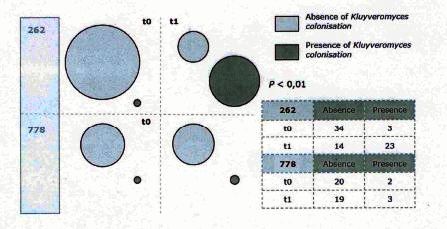- Home
- Research
- Human Health
- Gut Health
Gastric resistence and sattle in the intestine: Kluyveromyces B0399
Trial 138:Administration of a yogurt enriched with Kluyveromyces marxianus fragilis B0399 and Bifidobacterium l. BB12: a study on its impact on the intestinal microbiota of subjects with dysfunctional symptomatology
Pubblication:
Gut Microbes. 2012 Sep-Oct;3(5):406-13. Epub 2012 Jun 20.
Prof.Patrizia Brigidi*
Dr. Simone Meccaferri*
*Dipartimento di scienze farmaceutiche
Alma mater studiorum · Università di Bologna
The impact of taking yogurt supplemented with the probiotic cocktail (Kluyveromyces marxianus fragilis B0399 and Bifidobacterium lactis BB12) on the intestinal microbial composition (microbiota) was analyzed through PCR-DGGE. This molecular technique allows for a qualitative and semi-qualitative analysis of the predominant bacterial communities present in the feces of the subjects. The results obtained also indicate how the tested product , like the placebo, does not drastically modify the equilibrium of the principal intestinal microbial groups and therefore does not impact the architecture of the microbiota. confirms the elevated capacity of the strain K.marxianus B0399 to bypass the gastric barrier and settle in the intestine where it carries out its principal probiotic activities.
Fecal samples of subjects enrolled in the study were analyzed before administration of the yogurt to evaluate the intestinal microbial composition, and after administration to determine eventual modifications after treatment. The analysis of the indexes of similarity, of the indexes of difference of Shannon and of the DGGE profiles, both in reference to the predominant bacterial population and the type Bifidobacterium, demonstrated that the intestinal microbial composition after the administration in both the placebo and the yogurt, is stable.
This data represents an important positive result in that recent studies (Codling et al, 2009) underline how various pathologies (for example, Irritable Bowel Syndrome) are correlated to the marked instability of the intestinal microbial composition. The results obtained also indicate how the tested product , like the placebo, does not drastically modify the equilibrium of the principal intestinal microbial groups and therefore does not impact the architecture of the microbiota.
The analysis of the feces of the subjects participating in the study showed a scarce “natural” presence of K.marxianus before the treatment (5 subjects out of 59).
After the administration of fermented milk containing K.marxianus B0399, the analysis relative to the presence/absence of colonization showed a colonization of 62% (23 subjects out of 37) in the treated group.
This data confirms the elevated capacity of the strain K.marxianus B0399 to bypass the gastric barrier and settle in the intestine where it carries out its principal probiotic activities.
Still to be examined is an eventual correlation between the clinical results and the presence of K.marxianus B0399 in the analyzed feces.
Bibliografy:
Codling C, O’Mahony L, Shanahan F, Quigley EM, Marchesini JR, A Molecular Analysis of Fecal and Mucosal Bacterial Communities in Irritable Bowel Syndrome. Dig Dis Sci. 2009 Aug 20. [Epub ahead of print]
DOWNLOAD THE FULL PAPER
